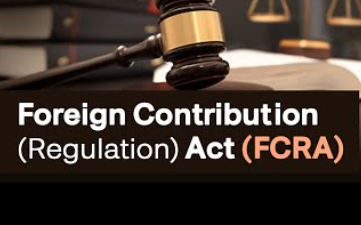Foreign Contribution Regulation Act (FCRA): Reasons for Denial
The Union Ministry of Home Affairs (MHA) has recently clarified reasons for denying Foreign Contribution Regulation Act (FCRA) clearances. This move comes after NGOs sought clarity on their denied applications. The ministry has outlined specific reasons, marking an important step in transparency.
Key Reasons for Denial
The MHA has listed several reasons for denying FCRA clearance. These include involvement in anti-development activities and religious conversions. Additionally, inciting protests with malicious intent is an important concern. Links to radical organisations also play an important role in the denial process.
Consolidated Reasons for NGOs
The ministry noted that it would provide consolidated reasons for the denial of renewal or registration applications. This decision follows representations from various NGOs requesting clearer guidelines. The MHA aims to enhance transparency and assist applicant associations in understanding potential issues.
Specific Violations Leading to Revocation
Earlier this year, the MHA revoked the FCRA licence of the Centre for Policy Research. This action was based on alleged violations of foreign funding laws. Five other NGOs also had their licences cancelled for similar reasons. These cancellations highlight the ministry’s strict enforcement of FCRA regulations.
Additional Grounds for Refusal
The ministry has identified other grounds for refusal. These include concealment of facts in applications. Pending prosecutions against office bearers also contribute to the denial. If an NGO has not conducted reasonable activities for two to three years, it may face rejection. Furthermore, refusal to provide necessary clarifications can lead to denial.
Renewal Applications and Compliance
For renewal applications, the MHA can deny clearance based on past fund usage. If funds are not used according to stated aims and objectives, the application may be rejected. Failure to upload annual returns or discrepancies in financial documents also serve as grounds for denial.
Current Statistics on FCRA Licences
16,023 NGOs hold valid FCRA licences. In contrast, 20,711 organisations have had their licences cancelled. This data reflects the tightening of NGO monitoring under the FCRA since 2020. The ministry’s rigorous approach puts stress on the importance of compliance with foreign funding regulations.
The FCRA was amended in September 2020, introducing important changes. Public servants are now barred from receiving foreign funding. Additionally, Aadhaar verification is mandatory for all NGO office bearers. The amendment also reduced the limit for administrative expenses from 50% to 20% of foreign funds.
Inspections and Audits of NGOs
The FCRA unit has conducted inspections of at least 335 NGOs from 2019 to 2022. These audits aim to ensure compliance with foreign funding rules. The MHA’s increased scrutiny reflects its commitment to maintaining the integrity of foreign contributions to NGOs.
Important Facts for Exams:
- FCRA – The Foreign Contribution Regulation Act regulates foreign funding to NGOs in India. It aims to prevent misuse of funds and enhance transparency in financial dealings.
- MHA – The Ministry of Home Affairs oversees internal security and foreign contributions in India. It plays a critical role in enforcing laws related to NGOs and foreign funding.
- CPR – The Centre for Policy Research is a prominent think-tank in India. Its FCRA licence was revoked due to alleged violations of foreign funding regulations.
- RGF – The Rajiv Gandhi Foundation is a charitable trust. It faced cancellation of its FCRA licence in 2022 for non-compliance with foreign funding laws.
Month: Current Affairs - November, 2024
Category: Legal & Constitution Current Affairs


